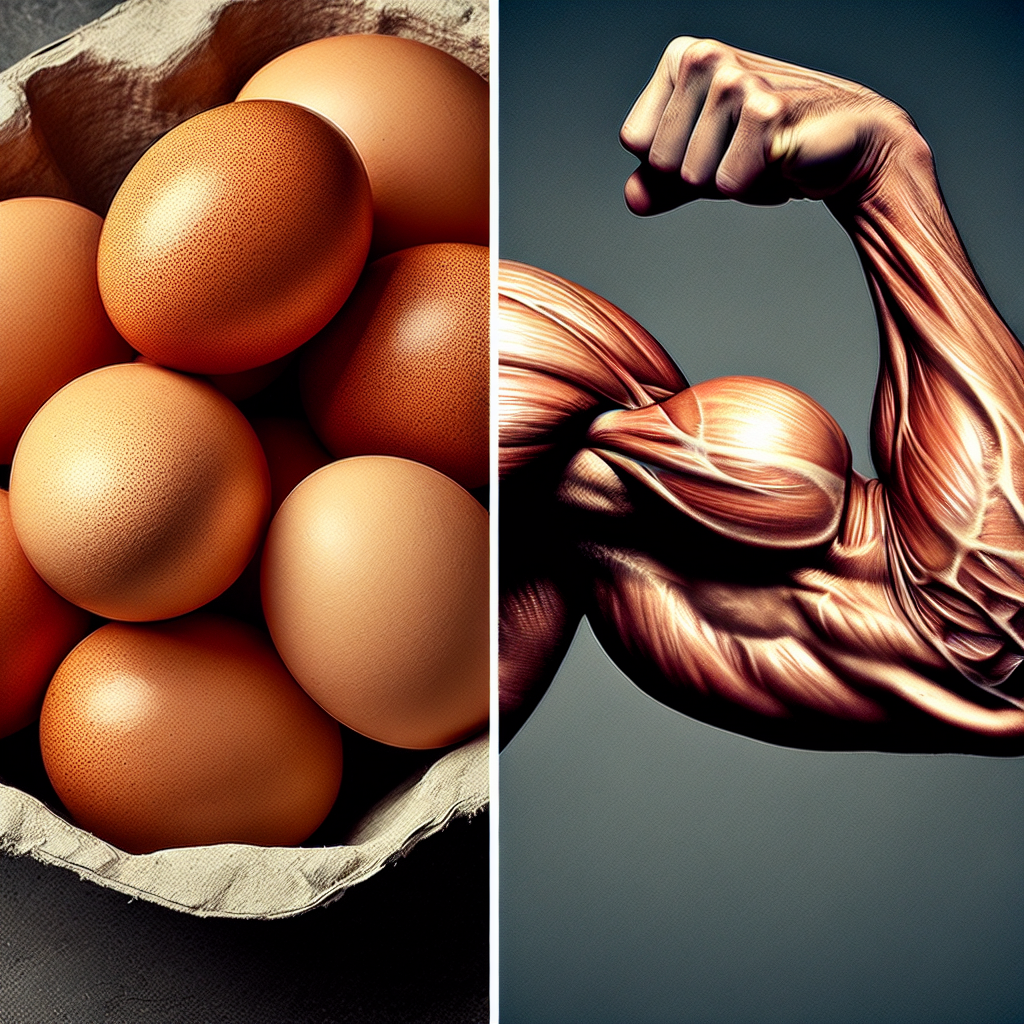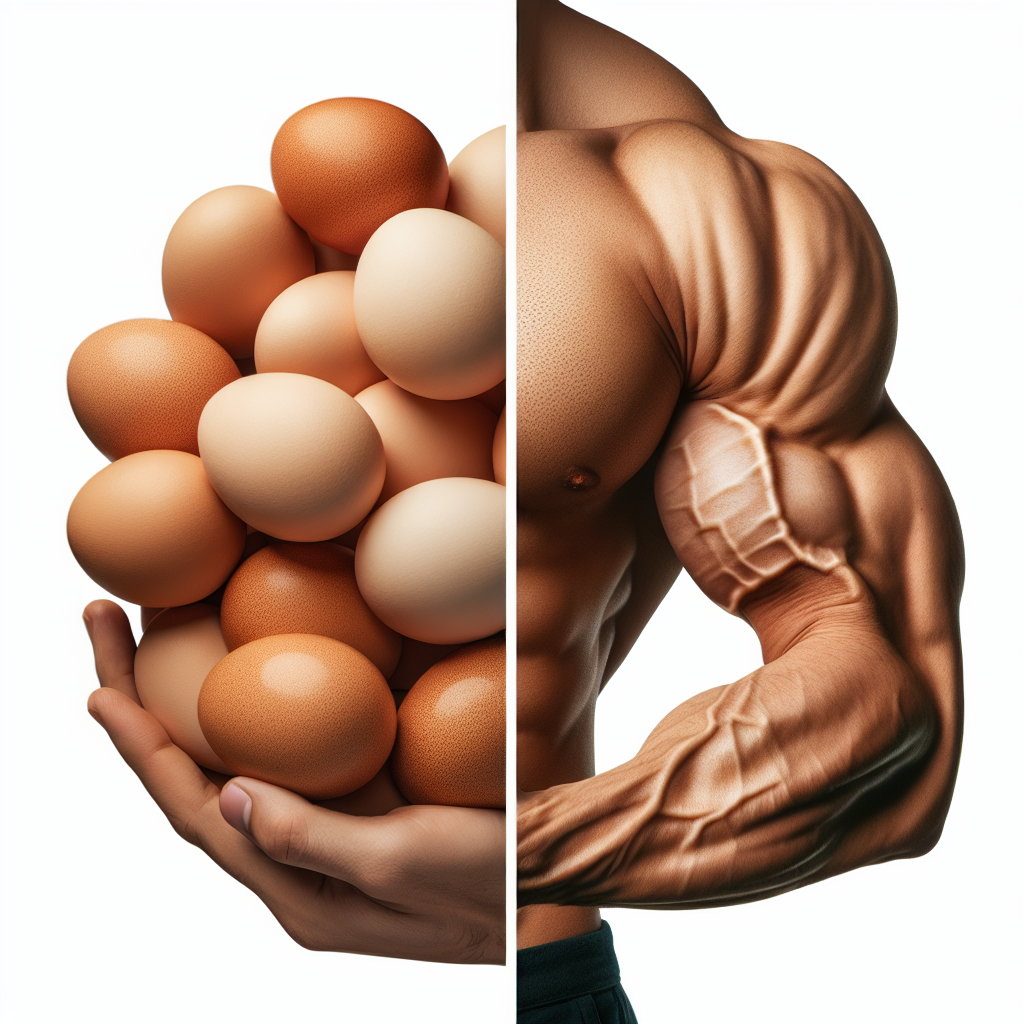Egg Consumption: How Many Should You Eat Daily to Build Muscle?
In the pursuit of muscle gains, you may find yourself in a scramble, especially when it comes to your diet. Get ready to crack the enigma around a quite familiar protein source – the humble egg. This article, “Egg Consumption: How Many Should You Eat Daily to Build Muscle?” walks you through the role of eggs in muscle development. Are you eating enough of them or too many? It’s time to explore concrete facts and practical suggestions related to egg consumption for building stronger and bigger muscles. Let’s crack this, shall we?
Understanding the Role of Nutrition in Muscle Building
When it comes to muscle building, many people focus exclusively on workouts and training protocols, forgetting the significant role nutrition plays. Balanced nutrition can contribute to effective muscle building and improved physical performance.
The importance of macronutrients
Macronutrients – protein, carbohydrates, and fats – are the three primary categories of the human diet. These macronutrients make up the bulk of the food we eat and supply the energy (calories) our body requires to function and thrive. For muscle building, each of these macronutrients has a unique role. Carbohydrates provide energy, fats act as a secondary energy source and assist in vital processes like hormone production, while protein is crucial for muscle repair and growth.
Why protein is pivotal for muscle building
protein plays a critical role in muscle building as it supplies the amino acids that the body uses as building blocks for the growth of muscle tissue. The process of muscle building involves creating micro-tears in the muscles` fibers during strenuous exercise, and it’s protein that helps repair these tears, leading to muscle growth. It means without adequate protein, muscle building efforts can be severely hampered.
Balancing other nutrients for optimal fitness
While protein is crucial, it’s not the only nutritional player on the team. Deliberate dietary balance helps ensure your body operates efficiently. Carbohydrates, for example, can provide the quick energy source needed for your workout. Plus, fats help with hormone regulation, including hormones like testosterone that are heavily involved in muscle growth. So while protein gets a lot of the spotlight, a balanced approach to nutrition will bring better results.
Unpacking the Nutritional Content of Eggs
When it comes to muscle-building foods, eggs are an often-mentioned staple. With a massive amount of nutritive value packed into a small package, it’s worth digging into exactly what an egg brings to the table.
Protein content in eggs
One large egg contains approximately 6 grams of high-quality protein. The protein in eggs is considered the most complete protein found in any food because it contains all the essential amino acids the body requires.
Vitamin and mineral composition of eggs
Eggs are nutritional powerhouses, containing various vitamins and minerals in addition to protein. These include vitamin B2 (riboflavin), vitamin B12, vitamin D, and minerals like iodine, selenium, and choline.
Understanding the caloric value of eggs
A large egg contains roughly 70-80 calories. This excellent caloric value means eggs can be included in your meal plan without drastically impacting your total caloric intake if you’re conscious about managing your weight.

Egg Protein vs Other Protein Sources
While eggs are an excellent source of high-quality protein, it’s necessary to compare them with other protein sources to get a broader perspective on protein intake.
Comparing egg protein with meat protein
In comparison to certain meat proteins, eggs contain less protein by volume. For instance, a similar portion of chicken or beef might contain twice the amount of protein provided by an egg. Nonetheless, the protein in eggs is of higher quality, and eggs also pack in vitamins and minerals unseen in meat.
Eggs and plant-based protein sources
Plant-based protein sources such as lentils, chickpeas, and quinoa are also important, especially for vegetarians and vegans. However, plant-based proteins are often incomplete, meaning they are missing some of the essential amino acids, so a combination of plant proteins is necessary for a balanced amino acid profile. Eggs, on the other hand, provide complete proteins.
Bioavailability of egg protein
Bioavailability refers to the proportion of a nutrient that is absorbed from the diet and used for bodily functions. The proteins in eggs are highly bioavailable. It means your body can easily access and utilize the protein in eggs for things like muscle building.
Benefits of Consuming Eggs for Muscle Building
Eggs offer a variety of benefits for those looking to build muscle due to their nutrient-rich profile.
How protein in eggs contributes to muscle repair and growth
As previously mentioned, the protein in the eggs provides the essential amino acids needed for muscle repair and growth. The protein content in eggs supports the repair of exercise-induced muscle damage and the addition of new muscle tissue.
The role of choline in muscle control
Eggs are an excellent source of choline, a nutrient that plays an essential role in maintaining healthy brain functions. But it also supports muscle control, so if you’re looking to exercise or bodybuild, choline becomes significantly important.
Vitamin D in eggs for bone strength and muscle function
Eggs are one of the few dietary sources of vitamin D, which is important for bone health. The health of your bones is directly linked to your muscular health, so ensuring you’re meeting your vitamin D needs is essential for anyone interested in building strength or muscle mass.

The Debate: Whole Eggs vs Egg Whites
For some time, there has been a debate about whether it’s healthier to consume whole eggs or just the egg whites. Both have their advantages and potential drawbacks.
Nutrition comparison
While egg whites contain a large portion of the egg’s protein, the yolk houses the majority of other nutrients. The yolk contains vitamins, minerals, and healthy fats, something you miss out on if you only consume egg whites.
Implications for muscle building
In terms of muscle building, consuming whole eggs may be more beneficial. Recent research has shown that whole eggs stimulate more muscle protein synthesis (the process responsible for muscle growth) than egg whites.
The role of dietary cholesterol in overall health
There have been concerns about the cholesterol content in egg yolks and its impact on human health. However, the relationship between dietary cholesterol (cholesterol from food) and blood cholesterol levels is complex and not as straightforward as once thought. For most people, consuming cholesterol in foods like eggs doesn’t significantly impact their blood cholesterol levels or increase their heart disease risk.
How Many Eggs Should You Eat Daily for Building Muscle
There’s no one-size-fits-all answer to how many eggs you should eat every day for muscle building. It depends on various factors.
Understanding recommended protein intake for muscle-building
The recommended dietary allowance for protein is 46 grams per day for women and 56 grams per day for men. However, if you’re regularly exercising or weight training, you may need more protein to support muscle repair and growth.
Translating protein intake to egg consumption
If we consider that one egg contains roughly 6 grams of protein, you would need to eat quite a few eggs each day to get your recommended protein intake from eggs alone. However, eggs are typically part of a balanced diet that includes other protein sources.
Considering individual factors: activity level, diet, health status
Your protein needs and how many eggs you should eat can depend on your activity level, overall diet, and health status. For instance, if you lead a very active lifestyle, your protein needs will be higher.

Optimal Times for Egg Consumption for Muscle Building
Timing your egg consumption can have an impact on your muscle-building efforts.
The importance of protein distribution throughout the day
Research suggests that distributing your protein intake evenly throughout the day can maximize muscle protein synthesis. Consuming eggs at various meals can contribute to this even distribution.
Eggs as part of pre-workout nutrition
Including eggs in your pre-workout meal can provide a good source of protein and fats, offering sustained energy release throughout your workout.
Eggs as a post-workout recovery food
The protein in eggs makes them an ideal post-workout food, helping to facilitate muscle repair and recovery after strenuous exercise.
Healthy Ways to Incorporate Eggs into Your Diet
There are countless ways you can incorporate eggs into your diet.
Delicious and nutritious egg recipes
Eggs are versatile and can be used in a variety of recipes. From the humble scrambled or poached egg to more intricate dishes like omelets and quiches, eggs are a flexible ingredient that can be a central feature of many meals.
Eggs in salads, sandwiches, and other meals
Eggs can also be added to salads and sandwiches or even used as a topping for pizzas. They make a filling and nutritious addition to any meal.
Tips for preparing eggs
Try to avoid frying eggs in a lot of oil or butter to keep their calorie content in check. Other preparation methods like boiling, poaching, or scrambling can be healthier alternatives.

Potential Risks and Considerations in Consuming Eggs Daily
While eggs have numerous health benefits, there are a few risks and considerations to take into account when eating them daily.
The cholesterol debate: Understanding the risks and facts
As mentioned before, the cholesterol content in egg yolks has been controversial. However, recent research shows that dietary cholesterol does not directly raise blood cholesterol levels in most people. Yet, if you have certain health conditions, such as diabetes, you might need to watch your egg intake.
Food allergy and intolerance concerns
Eggs are among the top foods that cause allergies, particularly in children. If you suspect that you have an egg allergy, it’s crucial to see your doctor before incorporating eggs into your diet.
Sustainability and ethical considerations
Issues around cruelty and the environment have led many people to consider where their eggs come from. Opt for cruelty-free or organic eggs if possible, and look into local farms that provide fresh eggs if you’re concerned about the agricultural industry’s impact on the environment and animal welfare.
Frequently Asked Questions about Egg Consumption and Muscle Building
How do I incorporate eggs into a vegetarian/vegan muscle building diet?
For vegetarians, eggs can be a prominent feature of the diet, providing an excellent source of complete protein. For vegans, however, it’s a different story as they do not consume any animal products, including eggs. In this case, it’s crucial to focus on a variety of plant-based protein sources.
Can I consume eggs if I have high cholesterol but want to build muscle?
While eggs do contain cholesterol, most people can safely eat eggs without causing significant increases in blood cholesterol levels. However, if you have high cholesterol or other heart disease risk factors, it’s best to consult with your doctor or a registered dietitian about your egg intake.
Is there such a thing as eating too many eggs in a muscle-building diet?
Like any food, it’s important to eat eggs in moderation as part of a balanced diet. While they are high in protein and other nutrients, they can also add to your daily calorie intake, so they should be consumed in a controlled manner. Always aim for a balance in your diet to ensure optimal health and muscle-building potential.


